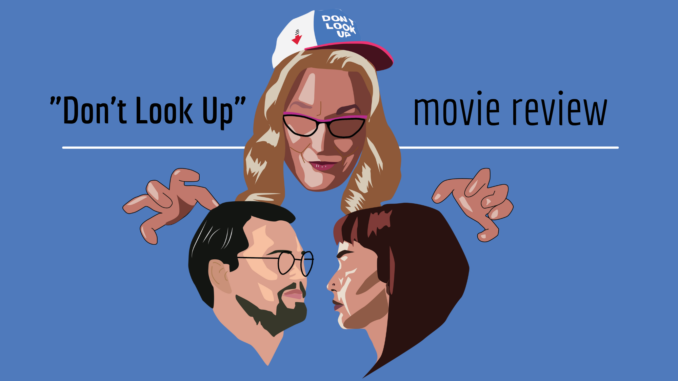
Dark comedy “Don’t Look Up” released on Netflix during late 2021, offering a doomsday narrative akin to ‘90s popcorn flicks “Armageddon” and “Deep Impact.” Injected with enough relevant social commentary to elevate the film above such fare, director and screenwriter Adam McKay’s piece is at once on-the-nose and worthwhile.
“Don’t Look Up” follows Dr. Randall Mindy and Ph.D. candidate Kate Dibiasky, two low-level astronomers operating out of Michigan State University. When Dibiasky discovers a comet predicted to inevitably impact Earth, she and Mindy go on a massive media tour to convince the government and populace at large of the planet’s fate.
Said media tour, however, quickly devolves into a seemingly hopeless effort to get anyone to take the threat seriously, from media-trained talk show hosts to the blundering President Orlean. As the administration fumbles their own efforts to deal with the comet both literally and publicly, Mindy and Dibiasky realize they must take matters into their own hands to incite action.
The parallels to reality are often obvious and worthy of note. “Don’t Look Up” is not shy about its connections to the current state of affairs in America and elsewhere: Orlean as a stand-in for incompetent leadership or the comet as an analogy for COVID-19.
It seems that McKay wants the audience to see these parallels for what they are: social commentary and, ultimately, calls to action. That’s where “Don’t Look Up” most notably succeeds, in its efforts to not just call attention to administrative failings, corporate greed and social ignorance, but to encourage change for the better through the resilience of its characters against the often frustrating odds.
All the while, “Don’t Look Up” works as what it ultimately is: a movie. Dark comedy is a notoriously difficult balance to strike, few directors having aced it.
While McKay doesn’t quite reach the heights of Martin McDonagh with his “Three Billboards Outside Ebbing, Missouri” or the Coen Brothers with their “O Brother, Where Art Thou?,” many of his jokes land satisfyingly deadpan and the film bears an overall atmosphere of, “Should I be laughing at that, or is this just sad?”
Much of this balance lends to the film’s cast. “Don’t Look Up” is chock-full of big-name actors, nearly all of whom bring some of their best. Leonardo DiCaprio and Jennifer Lawrence portray the main duo Mindy and Dibiasky, respectively.
While Lawrence plays the frustrated college graduate with all the postmodern cynicism asked of her, DiCaprio stands out as the film’s best performance. At each turn, he masterfully enlivens the role of helplessly awkward professor turned ambitiously righteous whistleblower, adding what appear to be his own real frustrations about American administration to his character’s psyche.
The film also features Meryl Streep as the crude President Orlean and Mark Rylance as supertech CEO Peter Isherwell, a Mark Zuckerberg type with the mannerisms of Elon Musk and style of Steve Jobs.
In all, while “Don’t Look Up” threatens to buckle under the weight of its occasionally overbearing cynicism — the title itself poking fun at the willingness to ignore a looming problem — the messages at play through McKay’s direction and the cast’s performances bespeak an ultimately hopeful narrative that is thoroughly enjoyable to watch.
The medium of film has always sought to turn a mirror on society. It’s easy to make it just that and nothing more. Thankfully, “Don’t Look Up” avoids this issue, instead offering a narrative that is both reflective and calling for change. 4/5
